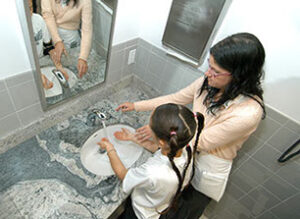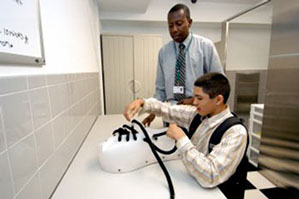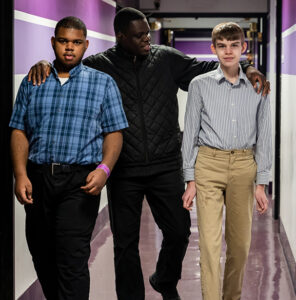Special Features for Students with Intellectual Disabilities
Intensive Toilet Training and Instruction in Daily Living Skills
 JRC has designed a classroom especially for intensive toilet training. Students are placed on a toileting schedule. The students receive praise and rewarding items or activities. This procedure has a 100% success rate. Students who have failed toilet training for years and even decades have been successfully trained in an average (median) of 152 days (range 99 to 222 days).
JRC has designed a classroom especially for intensive toilet training. Students are placed on a toileting schedule. The students receive praise and rewarding items or activities. This procedure has a 100% success rate. Students who have failed toilet training for years and even decades have been successfully trained in an average (median) of 152 days (range 99 to 222 days).
During the off-toilet time, students receive intensive one-to-one instruction in daily living skills such as buttoning, zipping, tying shoes, hand washing, brushing teeth, various chores, and computerized academics. Students are also taught to request the bathroom through the use of words, signs, or picture icons.
One to One Instruction in Basic Skills
 JRC provides one to one instruction to students who need training in skills such as asking for desired items or activities by signing, vocalizing, or exchanging pictures; reading; using JRC’s computers and computer software; self-care skills such as zipping and unzipping, buttoning, tying shoelaces, tying a tie, washing hands, and brushing teeth; and pre-vocational and vocational skills.
JRC provides one to one instruction to students who need training in skills such as asking for desired items or activities by signing, vocalizing, or exchanging pictures; reading; using JRC’s computers and computer software; self-care skills such as zipping and unzipping, buttoning, tying shoelaces, tying a tie, washing hands, and brushing teeth; and pre-vocational and vocational skills.
JRC staff use the methodologies of Applied Behavior Analysis (ABA) which include:
- discrete trials
- prompting and fading of prompts
- immediate rewards for desired responses
- individually created task analysis sheets
- timings and precision teaching technology
- recording prompt levels to measure student progress; and
- making data-based intervention decisions to insure progress and mastery.

JRC-created self-instructional software and touchscreen computers to teach basic skills
 JRC has developed unique software that teaches basic ABA training skills to autistic-like students, including pointing, matching to sample, naming letters and numbers, phonics, counting, telling-time, receptive vocabulary, sight words, using a computer mouse, and choosing a reward using a pictorial menu. This software enables students to continue learning on their own, even at times when they are not receiving one-to-one instruction from the teacher.
JRC has developed unique software that teaches basic ABA training skills to autistic-like students, including pointing, matching to sample, naming letters and numbers, phonics, counting, telling-time, receptive vocabulary, sight words, using a computer mouse, and choosing a reward using a pictorial menu. This software enables students to continue learning on their own, even at times when they are not receiving one-to-one instruction from the teacher.
Work Activities Center
 When JRC students become adults, they are eligible to enter JRC’s Work Activities Center, in which they do volunteer work, jobs at JRC, or work in the community.
When JRC students become adults, they are eligible to enter JRC’s Work Activities Center, in which they do volunteer work, jobs at JRC, or work in the community.


